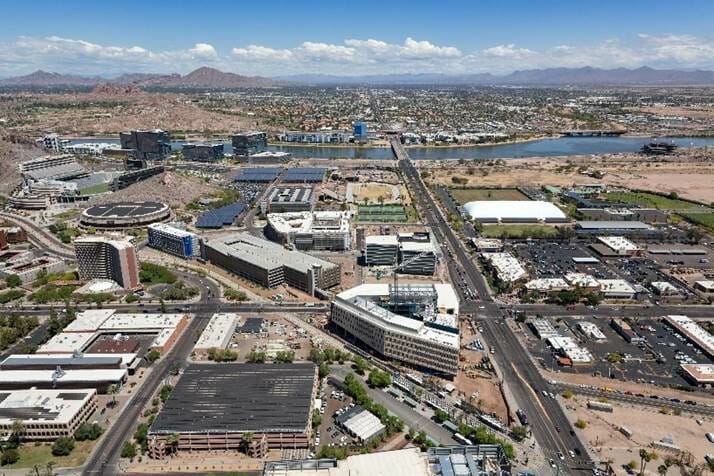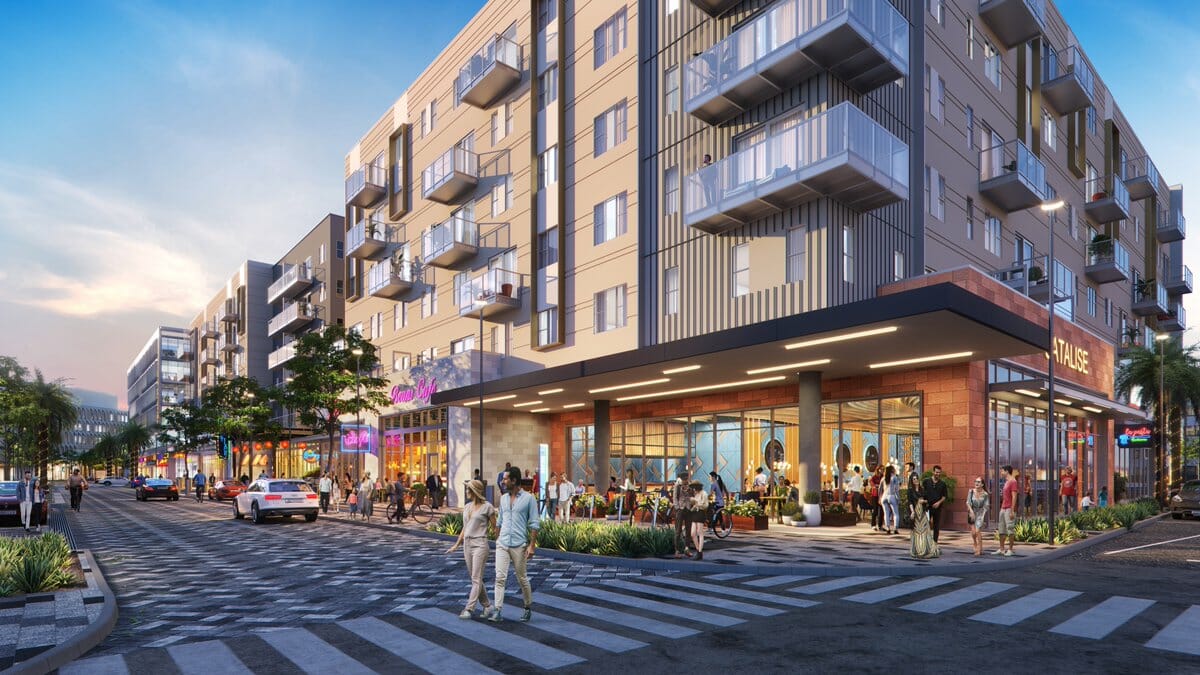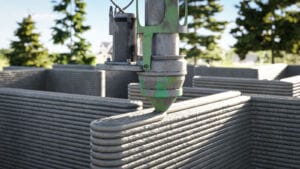From the start, Novus Innovation Corridor was designed to be distinctly different.
Now, well into Phase III of its development, Novus is realizing its vision of creating a walkable, sustainable neighborhood adjacent to Arizona State University’s Tempe campus that will be a model for modern urban cities.
When completed, Novus’s 355 acres will encompass more than 10 million square feet of urban, mixed-use development as a public-private partnership between the nation’s “most innovative university” and master developer Catellus Development Corporation.
DEEPER DIVE: Phoenix ranks No. 2 for most industrial real estate under construction
In 2010, ASU began plans to develop Novus as a live/work/play environment wherein companies can access ASU’s world-class research — and a highly educated and skilled workforce — to empower businesses of all sizes. It will also offer multifamily residential, hospitality and retail opportunities and be a major contributor to the state’s economic success.
The Novus Innovation Corridor vision
Spanning a 20-year buildout, Novus Innovation Corridor will ultimately include:
• 4.5 million square feet of premium Class A office space
• 275,000 square feet of retail stores, restaurants, and entertainment options
• 4,100-plus residences
• 1,000-plus hotel rooms.
The corridor also will provide outdoor gathering places for residents and visitors, along with numerous activities and events.
Land in Novus will be leased for private development while maintaining university ownership through a University Athletics Facilities District approved by the state legislature. The funds generated will create a sustainable resource for the construction and renovation of Sun Devil Athletics facilities.

New infrastructure
Novus has already made notable additions to the Tempe skyline with new office buildings, luxury living spaces, entertainment, and athletic venues. In 2014, Marina Heights — the regional hub of State Farm Insurance — was completed during Phase I. ASU’s Sun Devil Stadium was reinvented in Phase II, concluding in 2019.
Completed as part of Phase III in 2020, the 777 Tower provides over 160,000 square feet of state-of-the-art, Class A office space and over 8,000 square feet of street-level retail space located at the opening of Novus’ main street retail district. The six-story tower is currently 85% leased to ASU and Infosys, a global digital services and consulting firm.
Earlier this year, ASU dedicated its newest research building — the Rob and Melani Walton Center for Planetary Health — along the southern edge of Novus, underscoring the university’s commitment to science and the planet. The Walton Center is connected to Novus by an elevated bridge over University Drive, symbolizing the connection between ASU research and the work of private sector partners located in the innovation zone.
Tempe has new housing options thanks to the opening of The Piedmont, a six-story, 318-unit luxury apartment community. Transwestern Development Corporation is now working on additional upscale traditional and luxury micro-unit communities for working professionals.
There is a dual-branded Hyatt Place and Hyatt House hotel with 259 rooms, a rooftop pool and bar and uninterrupted views of the Tempe skyline.
And one of the newest additions — Mullett Arena — opened with fanfare in October 2022, as ASU’s men’s and women’s hockey teams hit the ice and the National Hockey League’s Arizona Coyotes played their home opener to an enthusiastic sold-out crowd. The arena also will be home to collegiate men’s wrestling, public concerts, youth competitions and other events.
Environmental impact
Novus has already been recognized as a leader in sustainable construction. The U.S. Green Building Council (USGBC) ranked Novus among the top 10 U.S. best-scoring LEED-ND (Leadership in Energy and Environmental Design – Neighborhood Development) projects of all time. The LEED-ND program is designed to curb urban sprawl by inspiring and helping to create more sustainable and well-connected communities.
Novus’s 777 Tower also achieved LEED Gold USGBC certification. ASU and Catellus are setting the standard for green living by making Novus the epicenter for transportation solutions, resource and utility usage and responsible waste management.
Economic impact
ASU’s Seidman Research Institute projects Novus will generate $4.6 billion in annual economic impact and add 34,000 jobs by 2035 through office, hotel, multifamily and retail operations. Novus’s more than 20,000 temporary construction jobs also will benefit the economy.
True to its vision, this trailblazing development will drive employment in advanced industries and bring lifelong learning, commerce, living, entertainment and research together in one location to exemplify the 21st-century university.
Authors: Dr. Morgan R. Olsen is the executive vice president, treasurer and chief financial officer of Arizona State University. Charley Freericks is senior vice president of Catellus Development Corporation, a national leader in transformational land and vertical development with a track record for solving complex redevelopment challenges.




